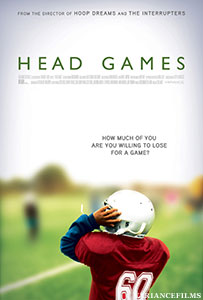In one memorable scene from the new documentary Head Games, former Harvard football player Chris Nowinski leads a symposium at a high school about brain trauma. The school's athletic trainer is skeptical. He confronts and scolds Nowinski for only mentioning the football players who have recorded brain trauma and ignoring those who don't.
"No, that's right," Nowinski responds. "I didn't talk about all the people who smoke and don't get lung cancer."
But the correlation between sports and brain injury is there, and scenes like this, and several others in which viewers meet high schoolers who have already suffered multiple concussions, provide troubling evidence. Despite advancements in research and evolving policies at the professional levels, the understanding of concussions still has a long way to go.
"The reality is we've just ignored concussion education for so long that people can’t believe that what they knew for the last 40 years is wrong," Nowinski said. "That's part of the problem. It's hard to imagine that we're OK with sending a kid out to a sport knowing that not only does the parent not know but the child doesn't know that when they get hit in the head and they feel funny, that they should speak up."
Throughout Head Games, created by Hoop Dreams director Steve James (below, left) and available for download on Amazon, the filmmakers pivot between interviews with some of the nation's foremost concussion experts, major sports executives, world-renowned athletes and a pee-wee football game in Chicago.
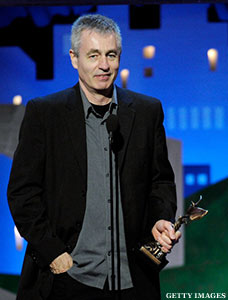
The football team, the Raiders, provides a dark contrast to the professional sports realm. The filmmakers intertwine the dueling narratives of veteran athletes dealing with serious brain trauma and young boys on the Raiders. One can't help but feel uneasy watching these youngsters, many of whom are just starting to embrace the game that led to the demise of a startling number of NFL retirees.
"As [the film] evolved I kind of came to realize that the most valuable thing I could do in this film is to do something that covered a broader landscape and really tried to separate the fact from fiction, at least as we know it now," James said. "And really help people, particularly parents and amateur athletes, to help get them more to make decisions about their sports options."
The film is based on Nowinski's 2006 book by the same name. Nowinski suffered multiple concussions during his career as a football player and professional wrestler, and he has been diagnosed with post-concussion syndrome. Since retiring from the WWE in 2004, Nowinski has dedicated his life to advocating and researching brain trauma. Nowinski led the groundbreaking 2006 investigation that found that former Philadelphia Eagles cornerback Andre Waters suffered from chronic traumatic encephalopathy before committing suicide. Since then he has worked tirelessly to track down and investigate dozens of brains from NFL veterans.
It is no coincidence that Nowinski’s work has coincided with the plethora of lawsuits filed by former players alleging the NFL hid information regarding brain trauma. And while the NFL battles its reitrees, the NHL is dealing with the saga of Sidney Crosby -- perhaps the league's marquee player -- as he recovers from a concussion that benched him for the better part of the past two seasons. In Head Games, former NHL All-Star Keith Primeau and Olympic soccer player Cindy Parlow speak earnestly and at times startlingly about how concussions derailed their careers and forced premature retirements.
But the documentary goes beyond these high-profile cases and chronicles the struggles of youth athletes, parents and coaches who don’t have the resources and/or knowledge necessary to stop significant head trauma.
In that way, the film serves as a sort of barometer, reflecting the varying levels of understanding of brain trauma among parents, the media and the professional leagues themselves. Nowinski, who has been at the vanguard of the expanding research and understanding of head injuries over the past half-decade, is perhaps the foremost catalyst for the issue's rise to national prominence.
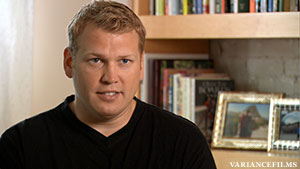
In 2007 Nowinski (at right) and renowned sports concussion expert Dr. Robert Cantu founded the Sports Legacy Institute to study brain trauma and prevention in athletes and other at-risk groups. About one year later, SLI partnered with the Boston University School of Medicine to form the Center for the Study of Traumatic Encephalopathy.
"There's probably no single individual that has played as much a role as Chris Nowinski in bringing this very serious public health issue to light," James said.
The film reviews the legacies of Nowinski's work during the past few years, including the day in December 2009, when the NFL finally admitted that concussions may have long-term consequences and pledged to donate $1 million to Boston University’s Center for the Study of Traumatic Encephalopathy.
For a variety of reasons -- a renewed interest player safety, a concern over image and a desire to protect their assets, among others -- the NFL and the NHL have taken significant steps to recognize and prevent brain trauma in their players during the past few years.
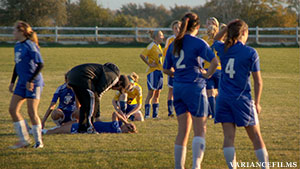
Now that the professional leagues are onboard, the most significant struggle is at the youth and amateur levels. But the problem is more widespread and harder to combat in these areas. For one thing, children's brains are less developed and their heads are more susceptible to injuries than adults. Beyond that, many children and their parents simply cannot recognize concussions or do not want to deal with the repercussions.
Experts like Nowinski are working feverishly to formulate new ways for children to keep playing the games they love while reducing the elevated risk. Ideas include limiting hitting in football practice and headers in soccer practice, building neck and core strength to offset whiplash, strengthening penalties for illegal plays and even creating hit counts for young football players.
While the most high profile head injuries occur in games, the majority of concussions happen in practice. Nowinski said that 75 percent of concussions at the college football level occur in practice. To combat the repeated blows to the head that accumulate over the course of years of practice, there is a movement to create a "hit count" for young football players.
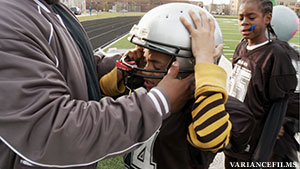
That way, players could only record a certain amount of tackles before a certain age. The idea is similar to a pitch count for baseball prospects: The less impact at an early age, the better.
Nowinski has helped organize an expert's conference on hit counts that will take place this fall. That's in addition to collaborating on the movie, re-writing and updating the book Head Games, serving as the executive director of the Sports Legacy Institute and the co-director of the Center for the Study of Traumatic Encephalopathy, and pursuing a Ph.D. in Behavioral Neuroscience at the Boston University School of Medicine.
"I would say my classes were about number five on my list of things that I've been doing the last year," Nowinski joked. "But my GPA is fine."

